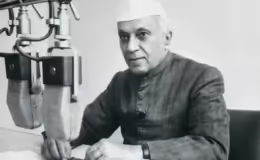In remembrance of the Irish daughter of Mother India
- By : Anirban Ganguly
- Category : Articles

She began her life of action and sacrifice with a rare directive and assurance of her Master: “Let me tell you frankly that I am now convinced that you have a great future in the work for India. What was wanted was not a man, but a woman; a real lioness, to work for the Indians, women specially… Your education, sincerity, purity, immense love, determination… make you just the woman wanted… You must think well before you plunge in, and after work, if you fail in this or get disgusted, on my part I promise you, I will stand by you unto death, whether you work for India or not, whether you give up Vedanta or remain in it.” “The tusks of the elephant come out, but never go back”; so are the words of a man never retracted.
Having received the final welcome from Swami Vivekananda, Sister Nivedita (1867-1911) set sail for India. It was the beginning of an eventful journey that left anindelible mark on the soul of the nation, and ended in the early hours of October 13, 1911, the day she “soared higher up upon the wings of eternity”. October 28 this year marks the beginning of the 150th year of Sister Nivedita’s birth, an occasion when we ought to strive to recall, re-live and re-articulate her profound contribution to national life.
It was after Vivekananda’s ascent in the Western firmament as a commanding voice of the East and of its perennial wisdom, that Sister Nivedita, then Margaret Noble, met the ‘Hindu Yogi’ on a November afternoon in a London West-end drawing room in 1895. A meeting that would not only redirect Margaret’s life but would also announce a new direction to the Swami’s work in India. Towards the end of his life Vivekananda once referred to ‘three tremendous upheavals in his whole life’: the first brought him to his Master Sri Ramakrishna, the second sent him to the US, and the third was his work in India after his return. It was in this “last and greatest of all” that Sister Nivedita was to play an epochal role. She breathed energy and a fire of conviction which was rarely seen, a fire which, while eventually consuming her, ensured that the soul of India soared out of her state of suppression and bondage.
Sister Nivedita’s foremost contributions in that sense were her unstinted support to early revolutionary nationalism in India, her deep involvement with the first utterances of the Indian cultural movement at self-expression, her experimentations and articulations on education when the first herculean effort at delineating a system of national education for India started, and in most of these she collaborated or had the support of the leading minds of the era—Sri Aurobindo, Rabindranath Tagore, Ananda Coomaraswamy to name a few. While Sri Aurobindo handed over to her the Karmayogin’s charge beforeleaving for Chandernagore and then Pondicherry, Tagore addressed her as “Lokmata”.








